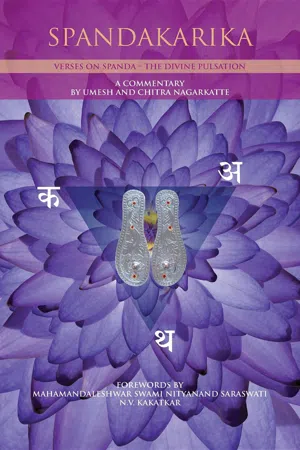
- English
- ePUB (mobile friendly)
- Available on iOS & Android
Spandakarika
About this book
A commentary on the 8th century Kashmir Shaivism text Spanda Karika (Verses on Divine Pulsation). This book is based on lectures given during weekly satsangs, prayer meetings, of the meditation center the authors ran from 1975 until 1982 under the guidance of their Guru, Swami Muktananda. The authors are professors of mathematics in two colleges of the City University of New York.
The same inquisitiveness, experimentation, openness, and logical thinking required in studying physical science (obviously in the waking state) is also necessary in studying spanda—the conscious pulsation. The experiences that the study of the conscious pulsation brings are real as per Einstein’s definition of reality since they also contain “sense perceptions that are common to different individuals… and in a measure, impersonal.” Many researchers, whom we call saints, separated by time and space and not in direct contact with one another, have reported the same sensory experiences. Also they have reported experiencing something common: that which is beyond sense perceptions.
The subject matter of the current text Spandakarika is the study of general nonrelational universal consciousness and special individual consciousness or awareness. The study leads one to experience that both are one and the same consciousness, whose essential nature is existence or truth and bliss, and whose manifestation is the entire universe regarded as consciousness’s pulsation
Tools to learn more effectively

Saving Books

Keyword Search

Annotating Text

Listen to it instead
Information
Table of contents
- Cover
- Title Page
- Copyright
- Foreword: Spanda Vijnāna
- Foreword: N. V. Kākatkar
- Preface
- Introduction
- Contents
- Part I: Nature of Spanda
- Part II: Spontaneous Rise of Knowledge
- Part III: Powers of Spanda
- Appendix – SpandaKarika Verses and their Meanings
- Bibliography
- Index
Frequently asked questions
- Essential is ideal for learners and professionals who enjoy exploring a wide range of subjects. Access the Essential Library with 800,000+ trusted titles and best-sellers across business, personal growth, and the humanities. Includes unlimited reading time and Standard Read Aloud voice.
- Complete: Perfect for advanced learners and researchers needing full, unrestricted access. Unlock 1.4M+ books across hundreds of subjects, including academic and specialized titles. The Complete Plan also includes advanced features like Premium Read Aloud and Research Assistant.
Please note we cannot support devices running on iOS 13 and Android 7 or earlier. Learn more about using the app